Tuesday 10 October 2023
Ada Lovelace Day Live is back! Our annual ‘science cabaret’ returned with a fantastic line-up of women in science, technology, engineering and maths (STEM), who shared their experiences, insights and expertise, inspiring and empowering the next generation of women in STEM.
Hosted by comedian Helen Arney, the show featured Prof Jennifer Rohn, head of the Centre for Urological Biology, University College London, Dr Azza Eltraify, senior software engineer at Ultracell Networks Ltd, Dr Sophie Carr, mathematician, Bays Consulting Limited, Dr Aarathi Prasad, writer, broadcaster, and geneticist, Dr Anjana Khatwa, Earth scientist and presenter, Dr Antonia Pontiki, biomedical engineer at King’s College London, and Rosie Curran Crawley, presenter at L’Oreal Young Scientist Centre.
You can watch all of the talks on the Ri’s YouTube channel.
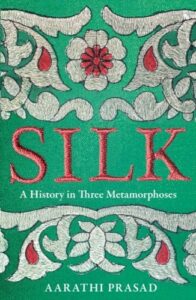
Book signing and stall
Once again, we had the fabulous Vivian Archer from Newham Books on hand to sell the very best science books by or about women. The book stall was available from 6:30pm until the performance started at about 7:30pm.
Dr Aarathi Prasad also joined us to sign copies of her newest book, Silk: A History in Three Metamorphoses before the performance. Aarathi is a writer, broadcaster, and researcher interested in the intersection of science and technology with cultures, history, health, and the environment.
What a great opportunity to get some personalised Christmas presents bought early!
Cash bar
The cash bar was open for the hour before the performance, so we encouraged everyone to get there early, relax with a beverage, and enjoy perusing our book stall or looking around the venerable Royal Institution, where so many momentous scientific discoveries have been announced.
Talks
We had some fabulous talks lined up:
Prof Jennifer Rohn – Why we should all be angrier about urinary tract infection
Upwards of 400 million people (mostly women) get a urinary tract infection annually, a figure that’s on the rise and which is associated with a worrying global crisis of antibiotic failure. Despite their apparent simplicity, UTIs are anything but straightforward: they are difficult to diagnose and treat, and often return again and again. When you delve into what’s happening deep within the bladder, where ancient but canny bacteria are pitted against our seemingly more advanced defence systems and often come out the winner despite antibiotics, it becomes clear why they are so challenging.
We’ve learned a lot about UTI in recent years, with some exciting new solutions on the horizon, but these laboratory findings don’t yet seem to have filtered into the consciousness – or training – of primary healthcare practitioners. Recently, patients have started to organize and make noise; time will tell if their activism leads to wider recognition, research funding, and ultimately, better diagnostics and cures.
Dr Anjana Khatwa – The Jurassic Coast: Take a leap into deep time
Whether we live in a city or a rural landscape, the beauty of rocks is that they are all around us. They speak of transformation and change over unfathomable timescales and can transport us to magical realms that now only exist in our imagination. The Jurassic Coast World Heritage Site is perhaps one of the most extraordinary places in the world where you can literally time travel with every step you take along its beautiful beaches. This possibility exists because a few hundred million years ago, the horizontal rock layers of the Jurassic Coast were uplifted and tilted towards the east. In a sheer geological coincidence, these tilted rocks are exposed along an actively eroding coastline which provides geologists with a near complete, continuous record of the Triassic, Jurassic and Cretaceous Periods that cannot be seen anywhere else in the world. 185 million years of Earth’s history in just 95 miles of stunning coastline.
When you gaze up at the cliffs, the rock layers sit on top of each other like a pile of books waiting to be returned to the library. The most overdue book rests at the bottom of the pile, weighed beneath those above it that are more recent withdrawals. Each strata forms a collective yet individual story of life during each geological period, thrillingly recorded as fossils locked inside the rock. For centuries, people like Mary Anning combed the beaches in search of these ancient treasures. Her discoveries and descriptions of rare fossils such as Plesiosaurs and Ichthyosaurs would give rise to a new field of scientific research known today as Palaeontology. The dynamic nature of the Jurassic Coast is part of its beauty and scientific value where natural processes constantly carve and shape the rocks into stunning natural forms such as Durdle Door. This is an extraordinary place where every step you take is not just along a beautiful beach but a leap through deep time.
Sophie Carr – Uncertainty, intuition, and superheroes
Within each of us lies a superpower: a tool that can transform our discomfort into confidence if we only acknowledge that hidden within us is a statistician trying to get out. Embrace the realm of Bayesian statistics, where uncertainty becomes a playground for the curious mind. We all grapple with the unknown everyday of our lives – from mundane to life changing decisions and fundamentally we evolve our decisions as information becomes available to us that reshapes our understanding of the world.
Just as superheroes in comic books and films adapt to situations so they can save the day, we alter our perspectives, recalibrating probabilities to match reality. We harness the dynamic duo of prior knowledge and new evidence, working them in tandem like a crime-fighting team, tackling uncertainty head-on. So, as we journey through life’s unpredictable terrain, let’s embrace our inner Bayesian superhero – refining our beliefs, adjusting our course, and triumphing over the enigma of the unknown. In this tale of uncertainty, intuition, and superheroes, the power to illuminate our path lies within us all.
Dr Aarathi Prasad – Silk
Among those who discovered the secrets of silk-producing animals are women who investigated their history, natural history, and developed technological applications of a material that has fascinated the world for millennia.
From the ancient uses of silk to the biologists who learned the secrets of silk-producing animals: manipulating the habitats, physiologies, and threads of moths, spiders and molluscs, this talk will explore the work of some of the women who have been key to understanding the natural history or developed technological applications of a unique material that has fascinated the world for millennia.
Dr Azza Eltraify – Greening the ICT world
Greening the ICT (Information and Communication Technology) sector has emerged as a critical endeavour in our increasingly digitalised society. With the rapid growth of ICT infrastructure and digital devices, concerns about their environmental impact have come to the forefront. This movement seeks to mitigate the carbon footprint of ICT systems by focusing on energy efficiency, sustainable practices, and responsible product lifecycles. Efforts in greening the ICT sector include the adoption of renewable energy sources for data centres and networks, reducing energy consumption through innovative technologies, and implementing eco-design principles to create more environmentally friendly electronic devices. Moreover, initiatives to extend the lifespan of electronic equipment, encourage recycling, and properly manage e-waste are integral to this global push for sustainability. By greening the ICT sector, we not only reduce the environmental burden but also harness the potential of technology to drive a more eco-conscious and responsible digital future.
Greening the ICT sector extends beyond mere environmental considerations; it also envisions a transformation of the ICT industry to be a catalyst for sustainability across various sectors. Smart cities, precision agriculture, telemedicine, and efficient transportation are just a few examples of areas where ICT can revolutionise resource management, reduce emissions, and enhance environmental monitoring. This transformational power lies in the convergence of cutting-edge technologies like the Internet of Things (IoT) and artificial intelligence (AI), which enable data-driven decision-making and optimisation of resource usage. As the world increasingly relies on digital solutions, efforts in greening the ICT sector represent an imperative fusion of technological advancement with ecological responsibility, ensuring that the digital revolution is not only efficient but also sustainable and beneficial for both society and the planet.
Dr Antonia Pontiki – 3D printing artificial organs
3-Dimensional printing has shown a great potential since it allows for customised healthcare solutions but can also be used for prototyping and research. It is progressively used in more medical fields every day to manufacture equipment, develop anatomical models for medical education, surgical planning and training, create prostheses and lately 3D bio-print tissues and organs. Studies have reported the benefits of using 3D printing in healthcare including the education of patients by explaining their pathology, customised medical instruments, improved surgical planning leading to higher precision during surgery, and reduced intraoperative bleeding and operating time.
My research involves exploring novel 3D printing techniques that, in combination with medical imaging, can be used preoperatively or intraoperatively, especially in thoracic surgery, for the creation of artificial organs or patient-specific prostheses. Developing a novel patient-specific rib prosthesis as well as a chest simulator for surgical training and planning, benefitted not only patients, but also clinicians and surgical trainees. Creating anatomical models of different parts of the human body may change education, patient simulations, and the training of the new generation of medical students and surgeons, improving the learning curve with lower costs and higher quality of training models.
Rosie Curran Crawley – Women of wonder
Jane Marcet’s Conversations on Chemistry was first published anonymously in 1805 and is thought to be one of the first science textbooks. After watching Humphry Davy’s lectures at the Royal Institution, Marcet believed it to be important to discuss these scientific principles in a familiar format, making them more accessible to women. The book consists of conversations between a teacher, Mrs. Bryant, and her two students Caroline and Emily.
These conversations reminded Rosie of the first time she felt excited by science with her chemistry teacher Ms Tratt. In her talk, Rosie invites us to take a step back to basics and remember what first sparked our own interest in science. She will demonstrate some experiments that Jane Marcet, her science teachers, friends, and Ri colleagues have taught her that led to her own fascination with science – sometimes all it takes is a conversation, and a few explosions!
About our speakers
Prof Jennifer Rohn
Head of the Centre for Urological Biology, University College London
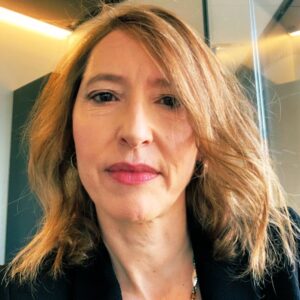
Professor Jenny Rohn is head of the centre for urological biology in the department of renal medicine in the Division of Medicine at University College London. Jenny runs a research laboratory studying urinary tract infection, an incredibly common malady that afflicts hundreds of millions of people each year and inflicts a tremendous healthcare burden. Despite this, like many diseases primarily affecting women, UTI has been historically understudied, and there have been no new therapies developed since Alexander Fleming discovered antibiotics nearly a century ago. Jenny and her team are working hard to find better ways to treat this notoriously tricky infection, where the bacteria have evolved many devious strategies to subvert our immune defences.
A dual USA/UK citizen, Jenny earned her PhD in microbiology at the University of Washington, Seattle USA in 1996. After a postdoctoral fellowship at the Cancer Research UK London Research Institute and a group leader position in a start-up biotech company in the Netherlands, she re-joined academia at University College London in 2006 with a Wellcome fellowship and was promoted to professor in 2021.
In her not-so-spare time, Jenny is also a science writer/communicator and public speaker, and frequently appears on radio, television and other broadcast and print media as a scientific expert in infectious diseases. She is the author of three published ‘lab lit’ novels about scientists (Experimental Heart, and The Honest Look, both from Cold Spring Harbor Laboratory Press, New York; and Cat Zero, from Bitingduck Press), and various published short stories. She also founded and edits LabLit.com, a website dedicated to scientific culture, literature and all things “geek chic”.
Dr Anjana Khatwa
Earth scientist and presenter
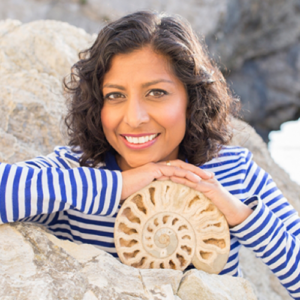
Dr Anjana Khatwa is an Earth scientist specialising in bringing stories about the origins and formation of natural landscapes to life for a wide range of audiences.
Anjana has appeared on BBC Four’s Beach Live as the show’s resident geologist expert, engaging audiences with her insight and knowledge about geology and fossils. She has also appeared on many shows, including ITV’s This Morning, Channel 5’s My Cornwall with Fern Britton, BBC Two’s Villages by the Sea and Fossil Detectives, More 4’s Britain’s Novel Landscapes, The History Channel’s How the Earth was Made and PBS’s Treasures of the Earth.
She is an established learning professional and has published numerous papers on glacial geology, developed award winning teaching resources and won the Royal Geographical Society Geographical Award for excellence in educating the public about the Jurassic Coast.
Dr Sophie Carr
Mathematician, Bays Consulting Limited
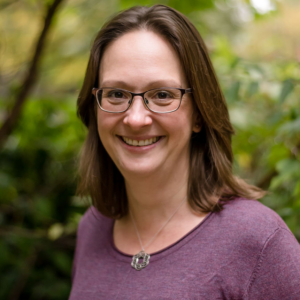 Dr Sophie Carr is the founder and director of Bays Consulting. Sophie’s first love was Lego, then aeroplanes and her career followed suit. She trained as an engineer and whilst working full time took a PhD in bayesian belief networks and has worked in data analytics ever since. Or to put it another way, Sophie has made a living out of finding patterns. Outside of work, Sophie is the vice president for education and statistical literacy at the Royal Statistical Society and the World’s Most Interesting Mathematician.
Dr Sophie Carr is the founder and director of Bays Consulting. Sophie’s first love was Lego, then aeroplanes and her career followed suit. She trained as an engineer and whilst working full time took a PhD in bayesian belief networks and has worked in data analytics ever since. Or to put it another way, Sophie has made a living out of finding patterns. Outside of work, Sophie is the vice president for education and statistical literacy at the Royal Statistical Society and the World’s Most Interesting Mathematician.
Dr Aarathi Prasad
Writer, broadcaster, and geneticist
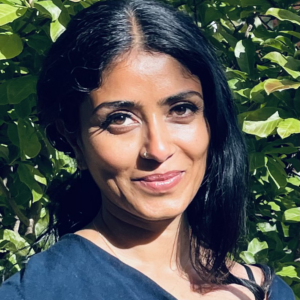
Dr Aarathi Prasad is a writer, broadcaster, and researcher interested in the intersection of science and technology with cultures, history, health, and the environment. She is the author of Silk: A History in Three Metamorphoses (2023), In The Bonesetter’s Waiting Room: Travels Through Indian Medicine (2016) which was a BBC Radio 4 Book of the Week and won the Popular Medicine Award at the BMA Awards 2017, and Like A Virgin: How Science is Redesigning the Rules of Sex (2012).
Aarathi has a PhD in genetics from Imperial College London and is an honorary research fellow at University College London’s department of genetics, evolution and environment, where she is part of an international team excavating and analysing ancient DNA from archaeological sites in Valencia, Rome, and Pompeii.
Dr Azza Eltraify
Senior software engineer, Ultracell Networks Ltd
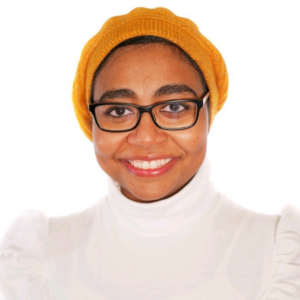 Dr Azza E A Eltraify is a project manager and senior software engineer for Ultracell Networks Ltd, a University of Leeds spinout focused on transforming networking infrastructures to improve energy efficiency and sustainability. Azza holds a PhD in electrical and electronics engineering from the University of Leeds and an MSc in networking and computer architecture from the University of Khartoum.
Dr Azza E A Eltraify is a project manager and senior software engineer for Ultracell Networks Ltd, a University of Leeds spinout focused on transforming networking infrastructures to improve energy efficiency and sustainability. Azza holds a PhD in electrical and electronics engineering from the University of Leeds and an MSc in networking and computer architecture from the University of Khartoum.
She worked at the University of Leeds as a research fellow in optimising power efficiency and developing PON architectures for future data centres. She led the development of several experiments on data centre architectures. Additionally, she currently holds the general secretary position for the Institute of Electrical and Electronic Engineers (IEEE) EEICT working group and the Green ICT standards committee focusing on developing energy efficient standards for data centres and core networks.
Ultracell Networks Ltd raised ~ £1.2m within its first year from different awards and grants. It was awarded £492,000 through the £36m Future RAN: Diversifying the 5G Supply Chain competition (FRANC) by the former UK Department for Digital, Culture, Media and Sport (DCMS). Ultracell’s Energy-efficient Cloudlets for ORAN (ECORAN) project aims to reduce the power consumption of the commodity hardware used by introducing novel ways of interconnecting and managing servers, accelerators, storage and interfaces in small processing cells (cloudlets).
Dr Antonia Pontiki
Biomedical engineer
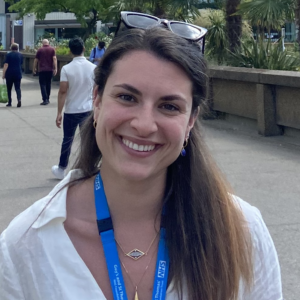
Dr Antonia Pontiki is a teaching fellow in biomedical engineering at King’s College London. Antonia teaches undergraduate courses and is also a researcher in the Department of Surgical & Intervention Engineering. Her research interests include chest wall reconstruction for cancer patients, 3D printing, artificial organs, biocompatible materials, and surgical simulators.
She completed her PhD at King’s College London in 2022 where she investigated the use of 3D printing in thoracic surgery. She is currently working with undergraduate and postgraduate students on the development of surgical simulators for training and practising surgical interventions, including chest wall, urological and head & neck simulators, in an effort to address the ethical and financial implications of using animals or cadavers in medical education.
Rosie Curran Crawley
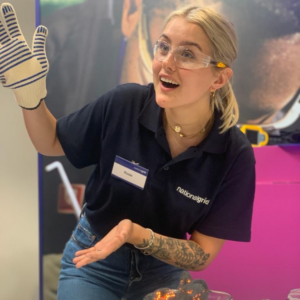 L’Oréal Young Scientist Centre Presenter
L’Oréal Young Scientist Centre Presenter
Rosie presents a wide range of exciting science workshops to young people aged 7-18 in the L’Oréal Young Scientist Centre. Having struggled to find the fun in science when she was at school, she now loves working as a science communicator bringing science to life for young people just like her!
Rosie first worked at the Royal Institution in 2018 as a laboratory assistant before going to university. Having gained a first-class BSc in biochemistry at the University of Bristol, she has worked as a freelance presenter for Wonderstruck and Great Scott! Productions at events across the UK and was excited to return to the Ri at the beginning of 2023.
Compère: Helen Arney
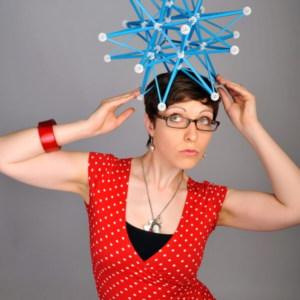
Comedian, writer, presenter
Writer, science presenter, geek songstress and ‘Voice of an Angle’ Helen Arney has appeared on TV, radio and in theatres across the world with her unique mix of stand-up, songs and science. You might have seen her explaining physics while riding a rollercoaster for BBC2 Coast, electrifying Sandi Toksvig on QI, singing the periodic table on Channel 4, smashing a wine glass with the power of her voice live on Blue Peter, hosting Outrageous Acts Of Science on Discovery Channel, or touring with science comedy phenomenon Festival of the Spoken Nerd. She also features as the voice of the bubble chamber in several collaborations between artist Yu-Chen Wang and CERN, and as the voice of the Periodic Table on Amazon Alexa in the US.
Helen is currently working on several full-length musical theatre projects about astounding women in STEMM, and has filled several notebooks with rhymes for Uranus (none of which are printable here).
Twitter | Facebook | Instagram | YouTube | Website
Venue
Ada Lovelace Day Live took place in the Theatre at The Royal Institution, London. You can find information about the venue on the Ri’s website, including travel details and accessibility.
Website: http://www.rigb.org/
Twitter: @Ri_Science
Address: 21 Albemarle St, London, W1S, 4BS.
With thanks to our sponsors
Ada Lovelace Day is dependent on the generosity of its partners, volunteers and supporters for survival. We would like to thank our host, the Royal Institution, and our media partner, Stylist, as well as our sponsors, Redgate, Arden University, Ada Infrastructure, The Information Lab’s Data School and dxw, for their support this year.